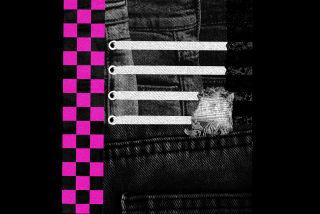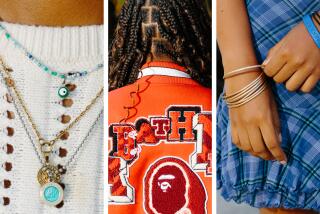Mom, Will Anyone in My Class Look Like Me?
- Share via
It is with more than a typical parent’s trepidation that I will send my firstborn off to begin kindergarten Tuesday.
I’ve done all the right things to get my daughter ready. After two years of preschool, she can write with a pencil and cut with scissors. She knows how to spell her name, recite her address and phone number, and write the alphabet and numbers to 100.
But there’s one thing I can’t prepare her for: The possibility that school will bring her problems unrelated to her academic abilities; pain that stems from the role we’ve foisted on her by making her the lone black child in a sea of white faces.
Almost all her life, she has been the only black child in her class or play group in our suburban San Fernando Valley neighborhood.
But that was more my problem than hers. It bothered me that she stood out so, that some other parents seemed to take such pains either to ignore her or to praise her effusively.
She, however, romped through her preschool years mostly oblivious to the differences between her and her classmates. The closest she came to encountering prejudice was when a little boy made fun of her hairstyle--her two braided ponytails in a class rife with long, flowing, blond locks--and made her cry.
But come Tuesday, I’ll walk her the three blocks to our local public school--once called a “country club school,” when it held only the children of white, upper middle-class, Porter Ranch families.
At the end of that walk, she will leave the cloistered, protected environment we’ve managed to maintain for her and enter the real world.
And as a black woman living and working in that white world, I know too well the pain she is likely to encounter.
I see it everywhere I look.
In the neighbors who decline to send their children to the local school, telling me, “There are too many minorities bused in.” And in the nice, young mother at the kindergarten open house who looked at me incredulously when I was introduced. “And you live in this neighborhood?”
The truth is, while half the school’s students are white, almost all its black and Latino children are bused in from overcrowded neighborhoods in South-Central Los Angeles. And there are few black families living in our neighborhood. But those facts don’t explain the assumption that we don’t belong.
As a Times education writer, I’ve written enough about schools to know some of what awaits my daughter. I’ve seen the way children segregate themselves by race on the playground and in the lunchroom. I’ve read the studies that show teachers expect less of their black and Latino students, and that those children, consequently, fare much worse in school than their white classmates.
I worry about insensitive teachers, ill-mannered classmates and even the innocent curiosity of her young peers who might never have known a black child. And I worry that, already, my little Alyssa worries.
As we lay in her bed, after I’d read to her the Berenstain Bears’ “Trouble at School,” Alyssa asked me one night not long ago: “Mommy, when I go to kindergarten, will there be anyone in my class who looks like me?”
I looked at her, with her honey-brown skin, chestnut hair and her solemn, dark-eyed gaze. “Nope,” I said, wrapping my arm around her and pulling her closer to me. “There won’t be anyone as pretty as you.”
She persisted: “But will there be anyone who’s brown like me?”
She still struggles with the notion that we’re black. African-American, she understands. Our ancestors came here from Africa, just as her friend Megan’s came from Ireland and her friend Stacey’s came from Korea.
But when she talks about our color, she speaks literally, looking from her baby sister’s dark brown skin to mine and her father’s, and pronouncing us all brown.
“Will I be the only one this time?” she wonders, no doubt recalling preschool, gymnastics, ballet, swimming . . . all the places where she looked around and found no other brown faces like hers.
I squeeze my eyes shut to keep the tears from spilling out.
When my husband and I moved to our tract home on a quiet Northridge cul-de-sac four years ago, we knew what we were leaving behind--neighborhoods racked by crime, plagued by overcrowded schools, and surrounded by decaying business and retail districts.
What we didn’t know is what we were coming to--that here, in spite of all the advantages of suburban living, we would have to face a different kind of ugliness.
It pains me to read about the 15-year-old black cheerleader in Orange County who was beaten almost beyond recognition, reportedly by club-wielding white youths yelling racial epithets. And the black couple in Agoura who have endured attack after attack on their home, replete with spray-painted swastikas and racial slurs. I hurt for those people, and I worry whether that kind of hate will spill over and touch my own family.
So far, our life in suburbia has been happy. Alyssa’s world has been safe and comfortable, gently circumscribed by her father and me. We choose her friends carefully and filter what she learns about the world. We think we’ve taught her to appreciate its diversity and to be proud of her dark skin and the heritage it represents.
But I’m afraid that when she enters public school, she’ll learn lessons other than 2 + 2 equals 4. She’ll learn that there are people in this world--in her own neighborhood and in her own classroom--who believe she doesn’t belong, that think she’s less worthy, less capable, less deserving than they are. She will see there are people who will label her by skin color and make her the outsider, doomed to be defined only by her differentness.
How do I prepare her to cope, to continue believing in herself? Is it enough merely to answer her questions as they arise? Or should I arm her, put her on the offensive, and prepare her to blunt the attacks that might never even come? Am I seeing bogey men that don’t exist?
In the long run, which is the bigger risk: Destroying my daughter’s innocence to protect her from the racism I expect her to encounter, or sending her blithely out into that big, mean world with only her sweet innocence as a shield, and hoping she blossoms like the flowers that survive in our polluted air?
I wonder and worry, but I have no answers. Right now, like my daughter, I have only questions.
More to Read
Sign up for Essential California
The most important California stories and recommendations in your inbox every morning.
You may occasionally receive promotional content from the Los Angeles Times.










